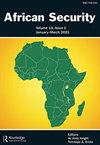Chieftaincy Conflicts in Northern Ghana: A Constellation of Actors and Politics
IF 1.3
Q2 POLITICAL SCIENCE
引用次数: 7
Abstract
ABSTRACT Chieftaincy conflicts in Ghana are often presented as disputes involving rival groups over succession to traditional political power. However, chieftaincy conflicts are complex and often shaped by constellation of different actors, national and local level politics and elite maneuvering. This paper argues that chieftaincy conflicts go beyond the structural interpretations of competition and contestation for traditional power, but rather processual, encompassing constellations of diverse actors, elite politics and manipulation. In Northern Ghana, the combination of structural and processual factors drive chieftaincy conflicts. Party politics in chieftaincy conflicts have rendered chieftaincy institutions, that are supposed to be apolitical in nature, political.加纳北部的酋长冲突:演员和政治的星座
摘要加纳的酋长冲突通常被描述为涉及敌对团体的传统政治权力继承纠纷。然而,酋长冲突是复杂的,往往是由不同的行动者、国家和地方层面的政治以及精英操纵所形成的。本文认为,酋长冲突超越了对竞争和争夺传统权力的结构性解释,而是过程性的,包括不同行为者、精英政治和操纵。在加纳北部,结构和过程因素的结合推动了酋长冲突。酋长冲突中的政党政治使本应具有非政治性质的酋长制度具有政治性。
本文章由计算机程序翻译,如有差异,请以英文原文为准。
求助全文
约1分钟内获得全文
求助全文

 求助内容:
求助内容: 应助结果提醒方式:
应助结果提醒方式:


